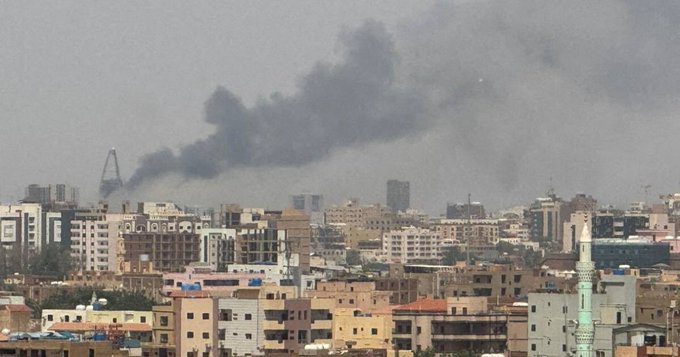The United Arab Emirates (UAE) has made serious allegations against the Sudanese Armed Forces (SAF), accusing them of targeting the residence of its ambassador in Khartoum, the capital of the war-torn African nation. The UAE’s accusations arrive amidst ongoing conflict between Sudan’s army and rival paramilitary groups. However, the SAF has categorically denied the claims, asserting that it does not target diplomatic missions in its operations.
In a statement released early on Monday, the UAE’s Ministry of Foreign Affairs expressed deep concern over what it described as a “heinous attack” carried out by a Sudanese military aircraft. According to the statement, this assault resulted in considerable damage to the residence of the UAE ambassador.
“The UAE has called on the army to assume full responsibility for this cowardly act,”
the ministry emphasized, underscoring its disapproval of such actions.
The ministry further added that these acts stand in stark opposition to international law, stating,
“The Ministry expressed its strong condemnation of these criminal acts and its permanent rejection of all forms of violence and terrorism aimed at destabilizing security and stability, in contravention of international law.”
The relationship between the UAE and Sudan has faced significant challenges since April last year, when clashes erupted between Sudan’s military and the paramilitary Rapid Support Forces (RSF). This once-stable relationship has only worsened, particularly after Sudan expelled 15 members of the UAE’s embassy staff in December. The expulsion came in response to the alleged removal of three Sudanese diplomats from the UAE capital, Abu Dhabi.
Compounding the diplomatic strain, Sudanese officials have frequently accused the UAE of providing military support to the RSF. A report from the United Nations presented what it called “credible” evidence, suggesting that the UAE had indeed sent weapons to the RSF through neighboring Chad. Abu Dhabi, however, has firmly denied these accusations, maintaining that its primary focus has been on advocating for peace.
Since the beginning of the conflict, the UAE has claimed to be a strong proponent of de-escalation, calling for an immediate ceasefire and encouraging dialogue between the warring factions. Despite these claims, tensions between the two nations have continued to rise.
The recent allegations have ignited further diplomatic tensions. On Monday, the UAE Foreign Ministry criticized the reported strike on the ambassador’s residence, calling it a blatant disregard for international conventions on diplomatic immunity. The ministry labeled it as a
“flagrant violation of the fundamental principle of the inviolability of diplomatic premises.”
In light of this, the UAE announced its intention to involve key international bodies, including the Arab League, the African Union, and the United Nations, urging them to take decisive action against the Sudanese Armed Forces.
However, the Sudanese Armed Forces issued a swift rebuttal, rejecting any responsibility for the attack. Instead, they shifted the blame toward the RSF, accusing the paramilitary group of orchestrating the incident.
“The armed forces does not carry out these cowardly acts and does not violate international law but only targets areas where the militia is present and that is within its right to defend the Sudanese nation,”
read the SAF’s official statement, attempting to distance themselves from the controversy.
The escalation in diplomatic tensions between the UAE and Sudan is occurring against the backdrop of continued violence in Sudan, a country grappling with one of the world’s most severe humanitarian crises. According to data from the United Nations, the conflict has resulted in tens of thousands of civilian deaths and injuries. Nearly eight million people have been displaced within Sudan, while an additional two million have sought refuge in neighboring countries.
Despite the rising conflict, efforts have been made toward peaceful resolutions. Just two months ago, UAE President Sheikh Mohamed bin Zayed Al Nahyan emphasized the importance of dialogue in bringing stability to Sudan. During a phone conversation with Sudan’s de facto leader and army chief, General Abdel Fattah al-Burhan, Sheikh Mohamed reaffirmed his country’s commitment to helping Sudan find a peaceful end to the conflict. This marked their first direct communication since the start of the violence, a hopeful yet delicate step toward reconciliation.
The Sudanese crisis has drawn attention from various international organizations, with many stressing the urgency of diplomatic solutions. However, the recent attack on the UAE ambassador’s residence has complicated these efforts, potentially pushing both nations further apart in an already fragile situation.

















